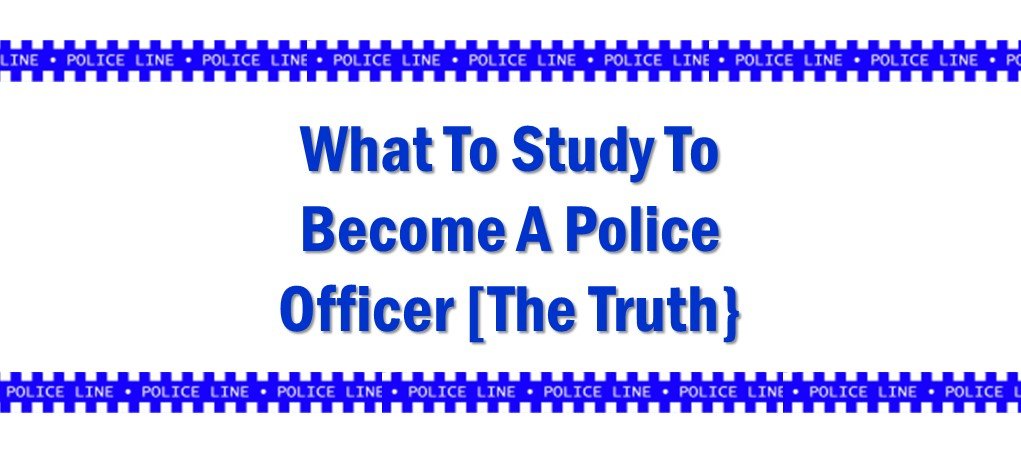What should I study to become a police officer is a common question that we all get asked by diligent students who are considering a career in policing. This article will take you through some of the main challenges a police officer faces and what is best to study at GCSE, A level, and degree level to become a police officer.
- What Does A Police Officer Do?
- So What Skills Do A Police Officer Need?
- A Police Officer Needs To Be Able To Communicate Effectively
- You'll Need To Be Responsible For Yourself, And Others.
- Police Officers Need To Possess Strong Leadership Abilities
- You'll Need To Demonstrate Good Judgment
- You'll Need To Have A High Level Of Physical Fitness
- You'll Need To Develop Interpersonal Skills
- You'll Need Strong Problem Solving Skills
- You Will Need High Levels Of Resilience
- So, What Should I Study To Become A Police Officer?
- What GCES and A Levels Should I Study To Become A Police Officer
- So What Would We Recommend Studying?
- Wrapping Up: What Should I Study To Become A Police Officer
What Does A Police Officer Do?
Police officers are responsible for responding to emergency calls, investigating criminal offences, enforcing the law, protecting the public, and providing leadership to the public.
They are often required to work long hours and deal with difficult situations.
Police officers must be able to think quickly in stressful circumstances and act decisively to protect themselves, the public, and those involved in the incident.
Police officers can be called upon to assist members of the public, including dealing with minor to major injuries and accidents, crowd control, assisting the elderly and disabled, and providing security and escort duties.
A police officer might also be required to attend court hearings, trials, and inquests.
A police officer works alongside colleagues, both within the same force area and outside it, and with other agencies, such as fire and ambulance crews, coastguards, social workers, and immigration officials.
So What Skills Do A Police Officer Need?
We’ve been through the generic role of a police officer and some of the scenarios they may find themselves in, but what skills do they need?
To determine what you need to study to become a police officer, we will look at the main skill set needed to try and map different topics to it.
A Police Officer Needs To Be Able To Communicate Effectively
Police officers must be able to listen carefully to others, understand what they say, and respond appropriately.
They must also be able to speak clearly and concisely in front of large groups.
This includes interacting with members of the public, fellow officers, supervisors, and partner agencies.
You’ll Need To Be Responsible For Yourself, And Others.
Police officers are expected to take care of themselves while working long hours and being exposed to dangerous situations.
However, they will also be expected to be responsible for others.
At times, those others may not want to support the police or even recognise that they need the help.
Officers are also held accountable for their actions, so they must be trustworthy, reliable, and honest. See the Code OF Ethics.
Police Officers Need To Possess Strong Leadership Abilities
In addition to communicating well with the public, police officers must lead by example.
As a leader, you’ll need to set clear expectations and standards for yourself and your team and hold everyone accountable to meet those standards.
You’ll Need To Demonstrate Good Judgment
Being a police officer requires making decisions quickly and under pressure.
You’ll need to ensure your choices align with best practices and are supported by solid evidence.
You’ll Need To Have A High Level Of Physical Fitness
Police officers spend many hours standing around waiting in vehicles, sitting behind desks, and walking long distances.
There may also be the need for a police officer to be physical with suspects, chasing them, detaining them, or even worse, protecting yourself from their attacks.
To succeed, you’ll need to maintain a healthy lifestyle.
You’ll Need To Develop Interpersonal Skills
Police officers regularly interact with people from different backgrounds, cultures, beliefs, and socioeconomic levels.
As well as this, they need to liaise with different partner organisations and charities.
You’ll need to learn how to build relationships and connect with diverse individuals.
You’ll Need Strong Problem Solving Skills
You will need to have the ability to think on your feet and find inventive ways to deal with problems.
This will often be with very few resources and working in quick time.
You Will Need High Levels Of Resilience
To be a successful police officer, you will need high levels of personal resilience.
There is no doubt that the job is demanding. There are long, unsociable hours that are often physically demanding.
Moreover, unfortunately, you will take a lot of abuse from the public. Even when people have called for your help, they won’t necessarily want to see you there.
Also, you will see a lot of harrowing sights, dead bodies, child neglect, and animal cruelty, all of this can take its toll on you, so you need high levels of personal resilience.
So, What Should I Study To Become A Police Officer?
Having looked at the role of a police officer and the different demands placed on a police officer, what subject do you think you should study to become a police officer?
The reality is that no one subject will teach you the skills you need to learn to become a police officer.
Moreover, with the new entry routes into policing, nobody needs a degree before entering the police.
The degree apprenticeship – PCDA (Police Constable Degree Apprenticeship) was brought in under the PEQF (Policing Education Qualifications Framework).
It allows people of any age to join the police without a degree.
The police will then pay for you to get your degree while working.
What GCES and A Levels Should I Study To Become A Police Officer
As you don’t need a degree to become a police officer, you may be working backward and wondering what GCSEs or A Levels to study to become a police officer.
Again, as with a degree, it does not matter what you study, as long as you achieve 5 GCSEs, at Grade 4 or above, or grade C, depending on when you took your GCSEs.
Passes in English and Maths are normally mandatory to most forces.
A-Levels are not required to join the police.
Studying subjects such as law or criminology will give you a good background in the UK criminal justice system. However, this is not essential.
Everything you need to know will be taught to you during your initial police training.
So What Would We Recommend Studying?
If you want to become a police officer, we recommend studying whatever interests you.
If you study what interests you, you are more likely to be successful and take more from the learning experience.
This will set you well in your future career.
If you don’t already have a degree and are thinking of joining the police, why not let the police pay for your degree for you?
You will get a degree with non of the debt.
This makes it a great choice for people thinking about going to university but don’t know what they want to study.
Wrapping Up: What Should I Study To Become A Police Officer
Other than your maths and English, study what GCSEs interest you if you intend to become a police officer. A levels are not essential, but if you want to go on and study A levels, study something that interests you. Gaining A levels will show that you’re capable of self-directed study, which is a good attribute. You do not need a degree to become a police officer, but you have two options, study what interests you or get a degree while training to be a police officer.




